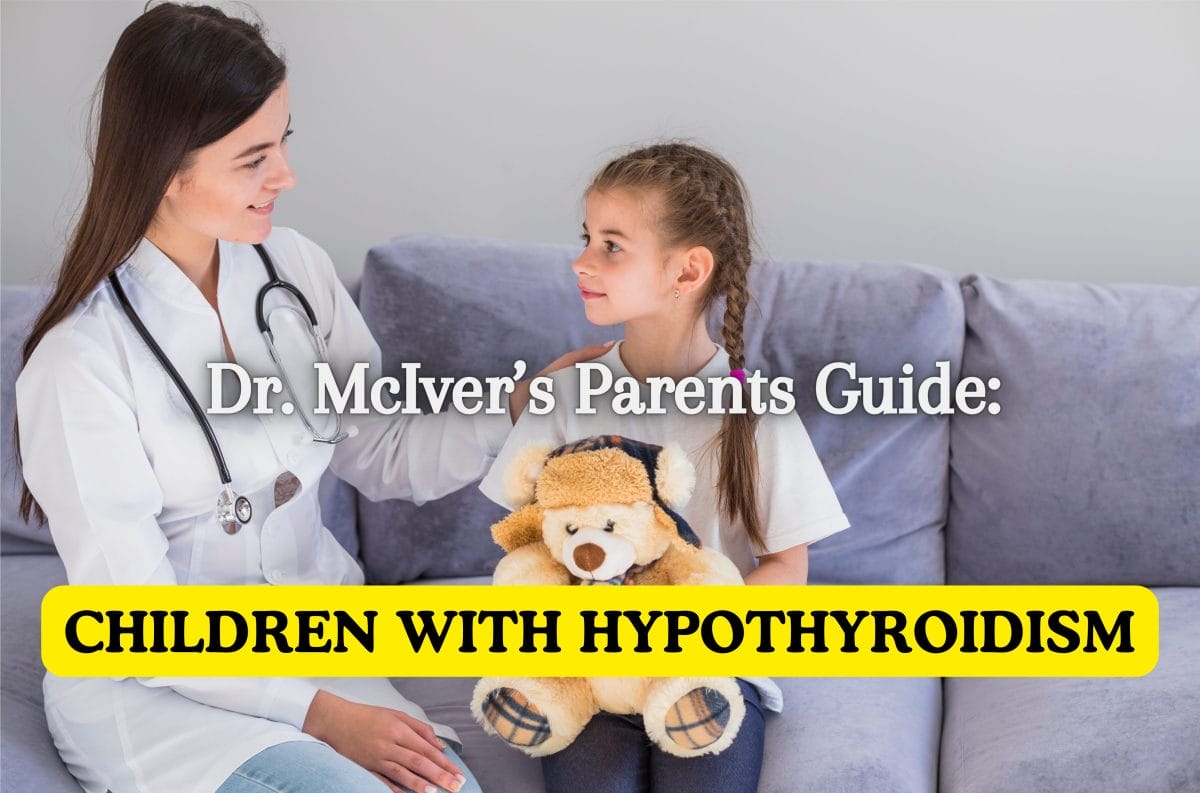As parents, ensuring the health and well-being of our children is a top priority. One aspect of pediatric health that deserves attention is hypothyroidism in children. In this comprehensive guide, we’ll explore key insights into understanding, identifying, and addressing hypothyroidism in children. Our expert source for this information is Dr. McIver, a board-certified Pediatrician and Pediatric Endocrinologist who practices telemedicine at DrMcIvermd.com.
Meet the Endocrinologist – Dr McIver
Dr McIver’s extensive medical background includes completing her residency at Tripler Army Medical Center and a fellowship in Pediatric Endocrinology at Walter Reed Army Medical Center. She provided pediatric endocrine care to children of Active-Duty Military parents and served as a general medical officer in Afghanistan. Currently married with two school-age children, Dr. McIver is a dedicated professional with a passion for maintaining the health of our youngest generation.
What is Hypothyroidism?
So, what is hypothyroidism in children anyways? To fully comprehend, it’s crucial to understand what this endocrine disorder entails. The thyroid, a small butterfly-shaped gland in the neck, plays a vital role in producing hormones that regulate various bodily functions. When the thyroid fails to produce enough hormones, it leads to hypothyroidism. Dr. McIver emphasizes the significance of this condition and its potential impact on a child’s growth, development, and overall health.
Hypothyroidism Symptoms in Children
Identifying hypothyroidism symptoms in children is essential for early intervention. Dr. McIver highlights key indicators such as fatigue, weight gain, cold sensitivity, sluggishness, and changes in mood. By being vigilant about these signs, parents can work with healthcare professionals to address the condition promptly.
How to Treat Hypothyroidism in Children
Once diagnosed, the question arises: How is hypothyroidism in children treated? Dr. McIver outlines treatment options, including thyroid hormone replacement therapy. This involves providing the child with synthetic thyroid hormones to compensate for the deficiency. Regular monitoring and dosage adjustments are crucial to ensure optimal thyroid function and overall well-being.
Nutritional Considerations for Children with Hypothyroidism:
Beyond medical interventions, Dr. McIver emphasizes the importance of nutrition in managing hypothyroidism in children. A well-balanced diet is crucial for supporting the thyroid’s function and ensuring that children receive the necessary nutrients for growth and development. Parents should work with healthcare professionals to create dietary plans that address the unique needs of children with hypothyroidism, ensuring they receive adequate iodine, selenium, and other essential nutrients.
Supporting Emotional Well-being:
In addition to the physical aspects of hypothyroidism, Dr. McIver emphasizes the impact it can have on a child’s emotional well-being. Hormonal imbalances can sometimes contribute to mood swings or changes in behavior. Parents play a vital role in providing emotional support, creating a nurturing environment, and fostering open communication with their children. Dr. McIver encourages parents to be attentive to any emotional changes in their child and, when needed, seek additional support from mental health professionals to ensure a holistic approach to their well-being.
Virtual Telemedicine Solutions with Dr. McIver:
In the era of technological advancements, accessing healthcare has become more convenient than ever. Dr. McIver, recognizing the importance of adapting to the changing landscape, offers virtual telemedicine solutions. Through DrMcIvermd.com, parents can schedule virtual appointments, allowing them to consult with Dr. McIver from the comfort of their homes. This approach ensures timely medical attention and expert guidance for parents navigating concerns related to hypothyroidism in their children.
The Role of the Endocrinologist
Endocrine disorders, including hypothyroidism, fall within Dr. McIver’s area of expertise. As a Pediatric Endocrinologist, she specializes in understanding and treating disorders related to the endocrine system, which plays a crucial role in hormonal regulation. Her membership in prestigious organizations like the American Academy of Pediatrics, the Pediatric Endocrine Society, and the Endocrine Society underscores her commitment to staying at the forefront of pediatric endocrinology.
Conclusion
In this parent’s guide to hypothyroidism in children, we’ve delved into the expertise of Dr. McIver, a dedicated professional who combines her extensive experience with modern telemedicine solutions. Understanding the symptoms, treatment options, and the convenience of virtual consultations empower parents to proactively address hypothyroidism in their children. Dr. McIver’s commitment to pediatric endocrinology ensures that parents have a knowledgeable ally in safeguarding the health and well-being of their little ones. For more information or to schedule a virtual consultation, visit www.DrMcIvermd.com.



